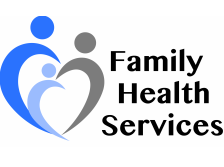Diabetes News – February 2020
February is National American Heart Month
Heart disease is the leading cause of death for both men and women in the United States. 28,291 Erie County adults had been diagnosed with high blood pressure. Locally, Heart Disease was the leading cause of death.* To help prevent heart disease and increase awareness of its effects, Family Health Services is proudly participating in American Heart Month.
(Source: Ohio Public Health Data Warehouse, 2015-2017
What is the link between diabetes, heart disease, and stroke?
Over time, high blood glucose from diabetes can damage your blood vessels and the nerves that control your heart and blood vessels. The longer you have diabetes, the higher the chances that you will develop heart disease.
People with diabetes tend to develop heart disease at a younger age than people without diabetes. In adults with diabetes, the most common causes of death are heart disease and stroke. Adults with diabetes are nearly twice as likely to die from heart disease or stroke as people without diabetes.
The good news is that the steps you take to manage your diabetes also help to lower your chances of having heart disease or stroke. To lower your risk:
Manage your diabetes ABCs
Knowing your diabetes ABCs will help you manage your blood glucose, blood pressure, and cholesterol. Stopping smoking and maintaining a healthy weight if you have diabetes is also important to lower your chances for heart disease.
“A” is for the A1C test. The A1C test shows your average blood glucose level over the past 3 months. This is different from the blood glucose checks that you do every day. The higher your A1C number, the higher your blood glucose levels have been during the past 3 months. High levels of blood glucose can harm your heart, blood vessels, kidneys, feet, and eyes.
The A1C goal for many people with diabetes is below 7 percent. Some people may do better with a slightly higher A1C goal. Ask your health care team what your goal should be.
“B” is for blood pressure. Blood pressure is the force of your blood against the wall of your blood vessels. If your blood pressure gets too high, it makes your heart work too hard. High blood pressure can cause a heart attack or stroke and damage your kidneys and eyes.
The blood pressure goal for most people with diabetes is below 140/90 mm Hg. Ask what your goal should be.
“C” is for cholesterol. You have two kinds of cholesterol in your blood: LDL and HDL. LDL or “bad” cholesterol can build up and clog your blood vessels. Too much bad cholesterol can cause a heart attack or stroke. HDL or “good” cholesterol helps remove the “bad” cholesterol from your blood vessels.
Ask your health care team what your cholesterol numbers should be. If you are over 40 years of age, you may need to take medicine such as a statin to lower your cholesterol and protect your heart. Some people with very high LDL (“bad”) cholesterol may need to take medicine at a younger age.
“S” is for stop smoking. Not smoking is especially important for people with diabetes because both smoking and diabetes narrow blood vessels, so your heart has to work harder.
Since this month is all about the heart, let’s talk about something you are going to love (and it’s good for you).
HEART KABOBS
INGREDIENTS
- Fruit of choice (such as watermelon, cantaloupe, honeydew, pineapple)
HOW TO MAKE IT
- Cut fruit into 1-inch thick slices. Place slices on a cutting board and use a small heart-shaped cookie cutter to cut out as many pieces as possible from each slice.
- Thread four heart-shaped fruit pieces onto a skewer, craft stick, or cake pop stick, starting at the bottom of each heart and poking through the top.
Try serving with a side of vanilla Greek yogurt and get a protein and calcium bonus. Even the pickiest eaters won’t turn down these pretty kabobs in conversation-heart candy colored treats!
Community Offerings:
HEALTH & WELLNESS SCREENING – offered by Firelands Regional Medical Center
You must Pre-register for all Lab Work at 419-557-7840.
Huron Health & Wellness Screening
Drs. Williamson and Rousseau
300 Williams Street Huron, OH
Saturday, February 15
7:30 AM – 9:30 AM
Sandusky Health & Wellness Screening
Firelands Main Campus
1111 Hayes Ave. Sandusky, OH
Saturday, March 7
7:00 AM – 9:30 AM
Norwalk Health & Wellness Screening
Dr. Ruggles
348 Milan Ave, Suite 2, Norwalk, OH
Saturday, April 18
7:30 AM – 9:30 AM
Health & Wellness Screenings include:
- Complete Blood Count with Metabolic & Lipid Panel (No Eating or Drinking for 12 Hours – Water Allowed – includes liver and kidney function studies, fasting blood sugar, thyroid, cholesterol, HDL/LDL and triglyceride levels along with a complete blood count.) – $45;
- Hemoglobin A1C (A three month report card on how well your blood sugars have been running. A test used to diagnose diabetes and/or to evaluate how well your treatment plan is working.) – $25;
- PSA (Prostate Specific Antigen)- $30;
- Vitamin D – $35;
- TSH – $25
Diet and exercise are an essential part of diabetes management. So is routine testing.
The A1C test—also known as the hemoglobin A1C or HbA1c test—is a simple blood test that measures your average blood sugar levels over the past 3 months. It’s one of the commonly used tests to diagnose prediabetes and diabetes, and is also the main test to help you and your health care team manage your diabetes. Higher A1C levels are linked to diabetes complications, so reaching and maintaining your individual A1C goal is really important if you have diabetes.
Last quarter, 68% of our diabetic patients had an A1C of less than 9%. Talk with your provider to discuss the right options for you.



